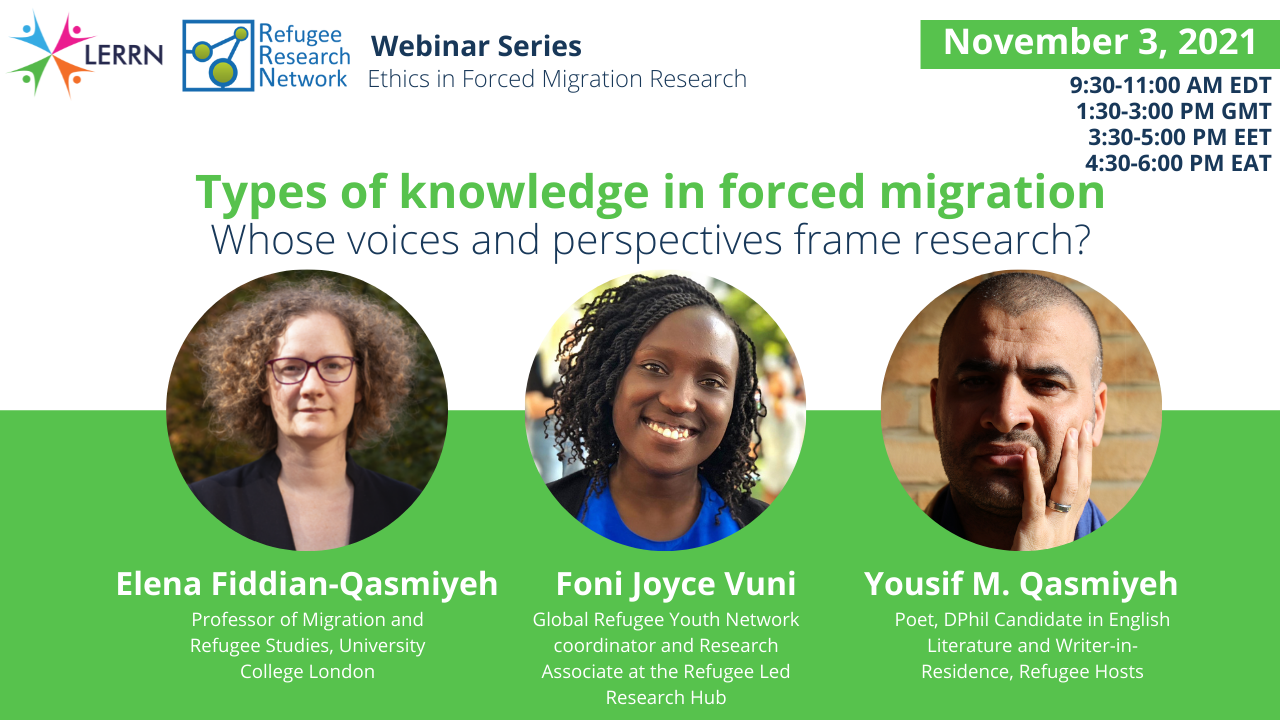The first webinar in LERRN’s Ethics in Forced Migration Research series, co-hosted with the Refugee Research Network, attracted 82 participants from 20 countries. While later webinars in the series will look at more specific aspects of the research process, the first webinar started with the important question of what knowledge and whose knowledge is valued in research and in policy processes. The webinar featured three speakers: Yousif M. Qasmiyeh (Poet, DPhil Candidate in English Literature, and Writer-in-Residence with the Refugee Hosts project), Foni Joyce Vuni (Global Refugee Youth Network coordinator and Research Associate at the Refugee Led Research Hub), and Elena Fiddian-Qasmiyeh (Professor of Migration and Refugee Studies, University College London).
Yousif started his comments by reading his poem “Anthropologists” from his recently published poetry book Writing the Camp. The poem highlights the often extractive nature of research practices that involve outside experts going into refugee camps and leaving with data, like recordings of refugee voices. Yousif pointed out that “We feature refugees as quotable materials but not as co-producers.” These practices also treat refugees as willing subjects for research. Remembering his childhood growing up in Baddawi Camp, Yousif recalled “how often people would knock on the door and assume we are ready to be interviewed” without first checking whether they wished to participate.
The speakers emphasized the importance of involving displaced people as genuine partners from the beginning of research. However, Elena warned against making assumptions about what members of displaced communities want from research. For example, not all members involved in research may be interested in co-authoring articles, some members may prefer to write poetry, and other members may not be interested in research at all. Foni Joyce highlighted the significance of co-designing research: “If you sit down as a researcher and think of your questions alone, and you have not included the community, that is not research for the community, it’s your own research, it’s you pushing forward your agenda.” For researchers, that involves giving away some of their power to shape the research. Coming up with questions with the community and allowing displaced researchers to be involved in research design ensures that research is sensitive and responsive to the community’s needs and goals. It also guards against the problem of repetitive research that revisits the same topics. Near the end of the research, it is important to translate research findings into the languages spoken by communities and share them.
Currently, knowledge coming from outside experts is seen as more legitimate than knowledge from members of the community. For example, when sharing the experiences of her community, Foni Joyce sometimes gets asked whether this knowledge can be verified with a link referring to a book, journal article, or report from a large humanitarian organization. Elena situated this conversation within long-standing debates in a variety of fields on Eurocentrism in academia and the designation of certain people and institutions as legitimate producers of knowledge. Forced migration studies has the potential to learn from other fields where similar conversations are happening and where the slogan “nothing about us without us” is also used.
The speakers lamented that types of knowledge outside of traditional academic research methods are still undervalued, even though they are sometimes considered or included in projects. Elena explained how certain types of knowledge are considered “serious” whereas other types of knowledge like photos or creative writing are considered “seasoning” on top of more mainstream projects. Giving an example of a project in Uganda that has used music, dance, and poetry to gather and share information related to child marriage in the community, Foni Joyce suggested that “we have to be able to open up and be flexible to accept these other forms of knowledge the community is also using.” One example is her powerful video poem “A letter to my future self” that was presented as part of UNHCR’s 2021 Executive Committee meeting. Foni Joyce also supported multilingual community focus groups as part of the drafting of the Global Compact on Refugees, which resulted in some recommendations from refugee communities being incorporated into the agreement. Yousif highlighted that written knowledge is not accessible to those who do not write, so oral forms of knowledge are equally important. The speakers also pointed out the need to pay attention to the ways different types of knowledge are used and whether they support or undermine the rights and well-being of people who are displaced. For example, statistics may be used to support surveillance activities and crisis narratives, but knowledge can also be used to hold those with power accountable for their actions that affect displaced communities.
Click here to watch a full recording of this webinar.
This report was prepared by Rachel McNally, LERRN Knowledge Mobilization and Translation Officer.
The LERRN-RRN Webinar Series on Ethics in Forced Migration Research is coordinated by Rachel McNally, LERRN Knowledge Mobilization and Translation Officer. For further information or ideas please contact us here.
